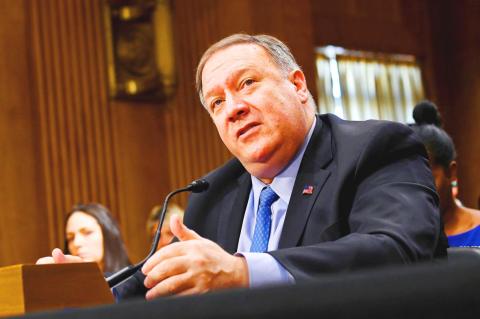US Secretary of State Mike Pompeo and three members of the US Congress voiced support for Taiwan on Wednesday, the 40th anniversary of the enactment of the Taiwan Relations Act (TRA).
At a congressional hearing on the US Department of State’s budget, Pompeo said that he plans to fully adhere to the TRA, which was signed into law on April 10, 1979, as well as the Taiwan Travel Act and the Asia Reassurance Initiative Act, which were both passed last year, to strengthen the US’ partnership with Taiwan.
“We have a lot going on with AIT [the American Institute in Taiwan] with our senators there,” Pompeo said, when asked if high-level US officials would visit Taiwan in the near future to demonstrate the US’ commitment to Taiwan.

Photo: Reuters
US Senate Foreign Relations Subcommittee on East Asia, the Pacific and International Cybersecurity Policy Chairman Cory Gardner said at the hearing that the TRA, the “six assurances” issued in 1982 by then-US president Ronald Reagan, the Taiwan Travel Act and the Asia Reassurance Initiative Act have become cornerstones of US relations with Taiwan.
The Colorado Republican said in an interview after the hearing that he believes Taiwan “has more bipartisan support than probably any country right now, any other place around the world.”
“I think it’s incredibly important that we continue to support the Taiwan Relations Act, today being the 40th anniversary, and we have a resolution in Congress to celebrate that recognition,” he said.
Following in the footsteps of the US House of Representatives, a group of US senators on Thursday last week introduced a concurrent resolution reaffirming the US’ commitment to Taiwan to mark the 40th anniversary of the enactment of the TRA.
Echoing Gardner, Senator Benjamin Cardin said that the US has made it clear that “we protect the rights of the Taiwanese people.”
“We raised that to the highest levels, so I think we have been straightforward and transparent about our concerns for the security of Taiwan,” Cardin said.
Asked what kind of role he would like to see Taiwan play in the US’ Indo-Pacific strategy, the two-term Maryland Democrat said that “Taiwan should be a partner.”
In an article titled “Four Decades of the Taiwan Relations Act Remains a Monument to our Resolve to Uphold Democracy” on US political Web site The Hill, US Representative Steve Chabot said that it is essential that the US continue to strengthen its bilateral relationship with Taiwan.
Chabot said that US support for Taiwan is becoming increasingly urgent, adding that “while the Communist Party of China has always sought to impose its view that Taiwan is a renegade province on the rest of the world, [Chinese] President Xi Jinping [習近平] is now taking a more aggressive stance.”
“If we are too scared of what President Xi might say, or of what Beijing might do, all our rhetoric about a ‘free and open Indo-Pacific’ is nothing more than hot air, and China has already won,” the long-time supporter of Taiwan wrote.
To mark the 40th anniversary of the TRA’s enactment, former House speaker Paul Ryan is to lead a delegation to Taiwan to attend a series of celebrations, the AIT said.

PREPAREDNESS: Given the difficulty of importing ammunition during wartime, the Ministry of National Defense said it would prioritize ‘coproduction’ partnerships A newly formed unit of the Marine Corps tasked with land-based security operations has recently replaced its aging, domestically produced rifles with more advanced, US-made M4A1 rifles, a source said yesterday. The unnamed source familiar with the matter said the First Security Battalion of the Marine Corps’ Air Defense and Base Guard Group has replaced its older T65K2 rifles, which have been in service since the late 1980s, with the newly received M4A1s. The source did not say exactly when the upgrade took place or how many M4A1s were issued to the battalion. The confirmation came after Chinese-language media reported

A Ministry of Foreign Affairs official yesterday said that a delegation that visited China for an APEC meeting did not receive any kind of treatment that downgraded Taiwan’s sovereignty. Department of International Organizations Director-General Jonathan Sun (孫儉元) said that he and a group of ministry officials visited Shenzhen, China, to attend the APEC Informal Senior Officials’ Meeting last month. The trip went “smoothly and safely” for all Taiwanese delegates, as the Chinese side arranged the trip in accordance with long-standing practices, Sun said at the ministry’s weekly briefing. The Taiwanese group did not encounter any political suppression, he said. Sun made the remarks when

The Taiwanese passport ranked 33rd in a global listing of passports by convenience this month, rising three places from last month’s ranking, but matching its position in January last year. The Henley Passport Index, an international ranking of passports by the number of designations its holder can travel to without a visa, showed that the Taiwan passport enables holders to travel to 139 countries and territories without a visa. Singapore’s passport was ranked the most powerful with visa-free access to 192 destinations out of 227, according to the index published on Tuesday by UK-based migration investment consultancy firm Henley and Partners. Japan’s and

BROAD AGREEMENT: The two are nearing a trade deal to reduce Taiwan’s tariff to 15% and a commitment for TSMC to build five more fabs, a ‘New York Times’ report said Taiwan and the US have reached a broad consensus on a trade deal, the Executive Yuan’s Office of Trade Negotiations said yesterday, after a report said that Washington is set to reduce Taiwan’s tariff rate to 15 percent. The New York Times on Monday reported that the two nations are nearing a trade deal to reduce Taiwan’s tariff rate to 15 percent and commit Taiwan Semiconductor Manufacturing Co (TSMC, 台積電) to building at least five more facilities in the US. “The agreement, which has been under negotiation for months, is being legally scrubbed and could be announced this month,” the paper said,